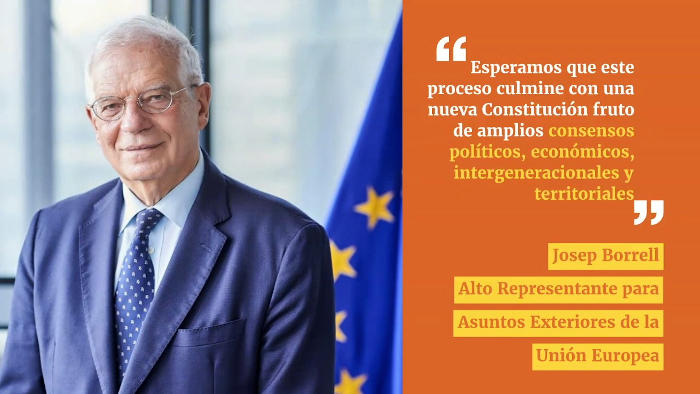The National Congress, through the Library of the National Congress of Chile, and the Delegation of the European Union, through the EUROsociAL+ programme officially launched a series of webinars called “Chile-European Union Dialogues” during which the High Representative of the Union for Foreign Affairs and Security Policy of the EU Josep Borrell highlighted the importance of social cohesion as the backbone of the Chilean Constitution.

Photo: Josep Borrell, High Representative of the Union for Foreign Affairs and Security Policy of the EU and Vice-President of the European Commission.
The constitutional process taking place in Chile is one of the most innovative in recent times. The Constitutional Convention elected has an equal representation composition and incorporates the participation of indigenous peoples, placing the process at the forefront of comparative constitutional law. Not only does it intend to draft and approve a new Constitution but also to carry out a model process that may serve as an international benchmark.
In this context, looking beyond one’s own borders is a valuable tool to nurture this consideration. That is why the National Congress, through the Library of Congress, and the Delegation of the European Union in Chile, with support from the EUROsociAL+ programme in whose management the FIIAPP participates, have launched a series of webinars entitled “Chile-Union European Dialogues”.
This series of webinars is part of the “Chile-European Union Forum” initiative with which the aim is to share both experiences of the constitutional process and essential content such as social cohesion, access to a welfare system and guaranteed fundamental rights, showing the lessons learned from European Constitutions from their diversity.
With participation by European and Chilean experts and parliamentary diplomacy, opportunities for exchange will be created that will enrich the dialogue on the matters that will be analysed when drafting the new constitution, taking a perspective that promotes a more sustainable, equitable and inclusive development.
During the opening event, the High Representative of the Union for Foreign Affairs (EU), Josep Borrell stressed that the European Union and Chile “are close partners and share fundamental values such as democracy, the rule of law and respect for human rights.” After the plebiscite in October 2020, Borrell stated that “we express our willingness to accompany Chile on this path” and that practically, from all the political, social and economic sectors of the country, “we have been asked to share information about European constitutional experiences.” That is why the High Representative of the Union for Foreign Affairs says that the EU “will help to create broad spaces for dialogue within the framework of this process, which we hope will culminate in a new Constitution, the result of extensive political and economic, intergenerational and territorial consensus.”
The President of the Senate of Chile, Adriana Muñoz, added that “Chile has begun a historic process to develop a new Constitution, to establish a new social and political pact for the coming decades. It will be unprecedented, due to its focus on citizens, parity and inclusive nature, so the National Congress is determined that the conventions and their work teams should have all the tools and information they need to fulfil their function and, within that framework, experience gained from other processes, such as those carried out in the European Union, are extremely valuable.”
The webinar included presentations by Tania Groppi, Professor of Public Law, University of Siena and Miriam Henríquez, Dean of the Law School of the Alberto Hurtado University, who addressed the challenges of a Constitution for the 21st Century.
In the closing ceremony, the Ambassador of the European Union in Chile, León de la Torre Krais, said: “This process should give rise to a fruitful dialogue and deep reflection on the country to be built, in a very participatory and inclusive way. We all trust that broad, consensual agreements will be generated, based on the fundamental values shared by the European Union and Chile.”
Meanwhile, the president of the Chilean Chamber of Deputies, Diego Paulsen, expressed his appreciation for the activity, noting that “the challenge of drafting a new Constitution calls on our country to broaden the debate, sharing perspectives and learning from experiences and realities in other parts of the world to enrich our own reflection. That is why the series of webinars called Chile-Europe Dialogues is so important. I am sure it will represent a great contribution that we hope will be reflected in our future Magna Carta.”
“Chile-European Union Dialogues” series of webinars
The “Chile-European Union Dialogues” webinars, organised by the Library of National Congress and the EU Delegation in Chile in collaboration with the EUROsociAL+ programme, has been structured around six Panel Discussions, each of which will address different themes. They will take place over the coming months until the installation of the Constitutional Convention.
Panel Discussion I will focus on the constitutional process itself, placing it within the framework of the democratic principle. Panel Discussion II will deal with social welfare, a central facet of the entire process. Panel Discussion III will address economic, environmental and technological development and sustainability. Panel Discussion IV will look at the institutional order and forms of State and government. Panel Discussion V will deal with gender, which is a cross-cutting subject that runs through the entire process and all its content. Panel Discussion VI will tackle fundamental freedoms, which are the essence of every Constitution. Successful European examples, but also negative European experiences, will be presented at all the panel discussions because they are valuable learning. The final objective is to provide models, ideas, arguments and European experiences that may be useful and valuable as a comparison parameter for the Chilean situation.
In addition to this series of webinars, organised in collaboration with the Library of National Congress, the “Chile-European Union Forum” will include series with state institutions, universities, think tanks and community organisations.



